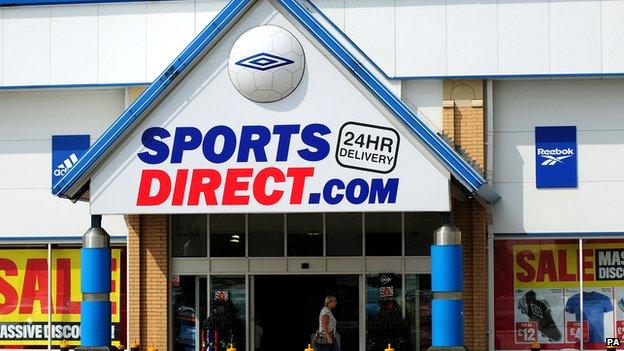Sports Direct billionaire Ashley 'needs power check'
- Published
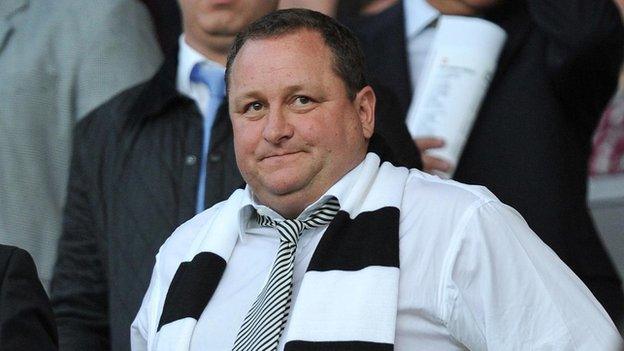
Billionaire Mike Ashley's Sports Direct International has been challenged in Parliament about how the firm is run.
Mr Ashley has been criticised before for the grip he has as a majority shareholder, on the firm - famous for selling top trainers on the cheap and indestructible oversized mugs.
The Institute of Directors says it has warned already that Mr Ashley holds too much sway and the IoD's senior advisor on corporate governance, Oliver Parry says that there is no "effective check on [Mr Ashley's] power".
Now his firm's handling of the collapse of one of its businesses, fashion chain USC, is also under scrutiny, being described at the Scottish Affairs Committee as "well dodgy".
When approached by the BBC, a spokesman for Sports Direct declined to comment.
USC, which sells clothing aimed at the younger market, ran into trouble last year after a row with a supplier. The company was losing £20m a year and collapsed into administration in January, with the loss of 83 jobs at the USC distribution depot in South Ayrshire, provoking some indignation in Scotland.
When the Scottish affairs committee met, external last month it was determined to find out more.
Members were told, though, that Mr Ashley simply wasn't available, external to answer parliamentarians' questions at any point during the month of March. Mr Ashley's legal representatives then took exception to the committee's habit of publishing correspondence, citing "concerns over confidentiality, external" and going as far as to invoke the European Convention on Human Rights.
Keith Hellawell, the company's chairman, was sent in Mr Ashley's place. But he told the committee he and the board hadn't known anything about the collapse of USC until the day before it folded. But, he said, chief executive Dave Forsey had begun "consulting" with administrators Duff and Phelps as early as 14 November. Dr Hellawell insisted the firm "didn't want" USC to fold.
'Well dodgy'
Perhaps even more controversially USC hasn't shut up shop. Almost immediately after it went into administration the fashion retailer was bought by another part of Mr Ashley's business empire, through a so-called pre-pack administration, and is trading again. But with less debt, according to MPs.
Conservative Simon Reevell told the Scottish affairs committee: "Sports Direct had a company that was losing money, they now have the same company where the debt liability that had been incurred has gone."
"At one level, to use a technical phrase, this all looks well dodgy," he added.
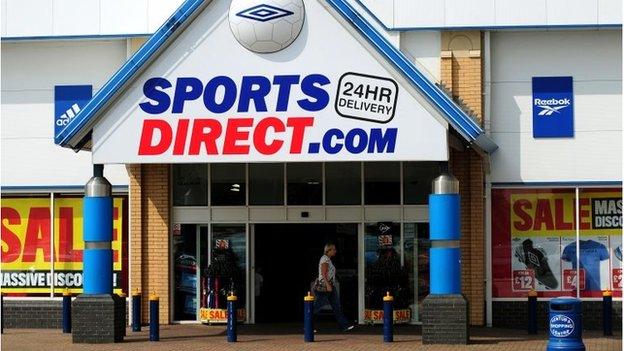
Mr Ashley built up his retailing empire after leaving school
The committee chairman, Labour's Ian Davidson, lamented how the process left the taxpayer "done over" in having to meet redundancy costs and unpaid taxes. Dr Hellawell countered that by saying the company had paid more than £1.3bn in tax to date.
Board authority
This latest controversy builds on earlier concerns.
The IoD previously criticised a £200m payment to employees, external, including Mr Ashley. The company didn't disclose his share of the award. But "we expect as a majority shareholder he got the majority of that," said Mr Parry.
Paying a dividend, which would have been shared among all shareholders, may have been more appropriate, said Mr Parry.
There are even more questions swirling around the collapse of USC.
"Could they have done something about it? And could they not have told shareholders and staff?"
If there had been a failure to inform the board sooner, this would suggest a lack of respect for the board's authority, he said.
Workers were given even less notice, 15 minutes, before they heard they'd lost their jobs, the committee was told.
Fatter margins
To be sure, Mr Ashley has built a very clever business model. As well as owning stores, Sports Direct owns rights to popular brands such as Slazenger, Dunlop and Lonsdale. Good margins on these products mean he can afford to sell big brand products from the likes of Nike and Adidas at a greater discount than competitors, luring in shoppers.
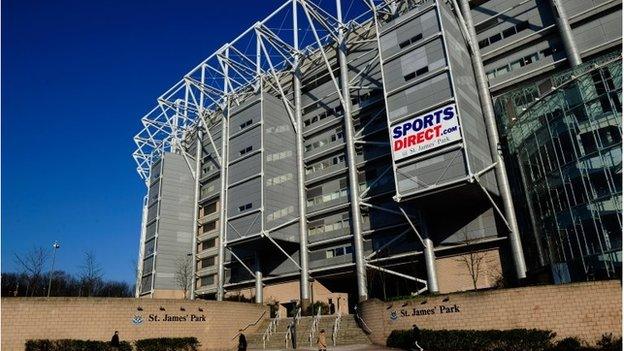
The company's success has made Mr Ashley a billionaire - he now owns Newcastle United Football Club
So when a customer pops in for a pair of Nike trainers, they can also be tempted to buy a Slazenger T-shirt or a pair of Lonsdale shorts with a fatter margin for Mr Ashley.
Short leases on its stores mean it can be more flexible with demand, quickly shutting up shop and moving elsewhere if sales drop.
It's a formula that has brought riches to shareholders in the long run. Those who bought shares in 2007 for £3 apiece when Mr Ashley floated his firm would have more than doubled their money today. Luckier punters could have snapped up shares for as little as 32p in the crisis in 2008 and sold them last year for more than £8.
The firm has also been criticised for its zealous use of zero hours contracts, which don't guarantee regular work. Mr Hellawell told MPs that 4,300 of the firm's 19,000 staff were permanent. The rest of its workers are employed on zero-hours contracts.
In terms of what must be done at Sports Direct, the IoD's Mr Parry said: "It's hard to be prescriptive, but power lies with shareholders" who must voice concerns at the firm's annual meeting on 10 September.
Investors, employees and customers alike can watch Mr. Ashley to see whether this time he'd like to defend himself against these new allegations
- Published9 June 2014
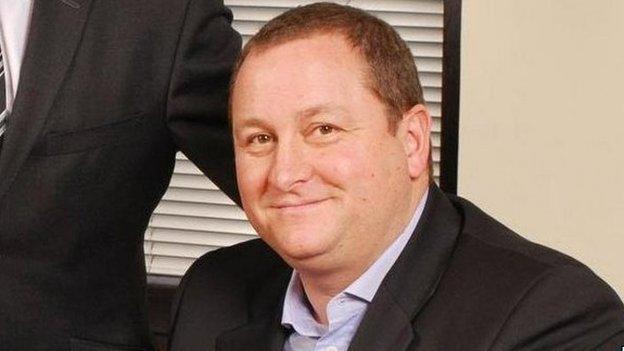
- Published2 April 2014
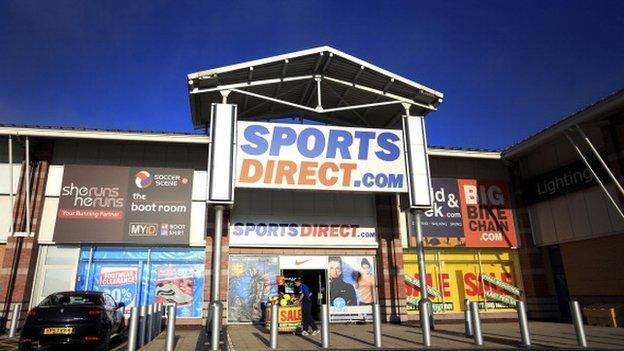
- Published15 November 2014
